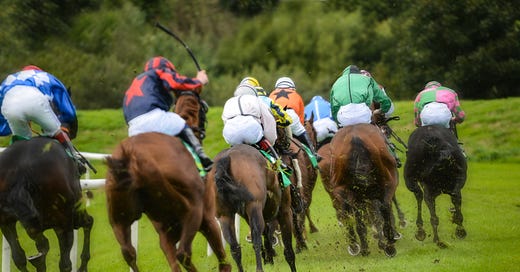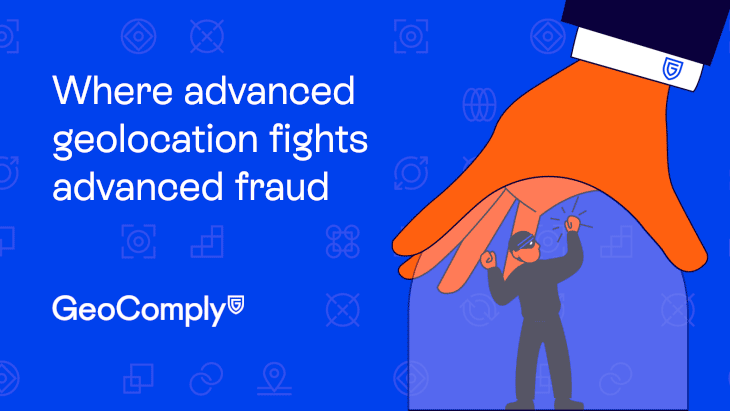Off To The Races
Horse racing is on the decline, but does interest in tentpole events like the Kentucky Derby provide hope for a brighter future?
The Bulletin Board
THE LEDE: Can horse racing make a comeback?
ROUNDUP: WV PG app; Fixed-odds racing in LA; Gov. signs IL budget; NY sweeps bill update; Tribal bill in Congress; TIG’s new boss; Another amicus.
NEWS: Maine House passes iCasino bill; tough sledding ahead.
AROUND the WATERCOOLER: Bettors are unhappy with Kalshi’s fees.
STRAY THOUGHTS: Say what you mean; mean what you say.
Sponsor’s Message: Increase Operator Margins with EDGE Boost Today!
EDGE Boost is the first dedicated bank account for bettors.
Increase Cash Access: On/Offline with $250k/day debit limits
No Integration or Costs: Compatible today with all operators via VISA debit rails
Incremental Non-Gaming Revenue: Up to 1% operator rebate on transactions
Lower Costs: Increase debit throughput to reduce costs against ACH/Wallets
Eliminate Chargebacks and Disputes
Eliminate Debit Declines
Built-in Responsible Gaming tools
To learn more, contact Matthew Cullen, Chief Strategy Officer, Matthew@edgemarkets.io
The Lede: Is Horse Racing Fixable or Permanently Broken?
The glory days of horse racing are in the distant past, but as Mark Twain might say, the rumors of its death have been greatly exaggerated. It must be, since I’m writing about it for the second time in a few weeks.
“Tracks are closing or reducing their race days, attendance is down, and there is still a contentious debate over animal safety, but tentpole events like the Kentucky Derby continue to draw large crowds and generate significant wagering, indicative of sustained interest in high-profile races.”
The million-dollar question is, how does horse racing get its groove back outside of Triple Crown races?
Much like land-based casinos, tracks must figure out how to offer an engaging experience. It’s 2025, people can gamble on anything, anywhere, at any time of the day. You need to give them a reason to visit, and as we see with the World Series of Poker or Kentucky Derby and Belmont numbers, they will go to a casino or a racetrack for an experience.
Horse racing faces three key challenges to overcome before it can expand beyond tentpole events and become a daily experience.
Problem #1: It has an optics problem.
The facilities are not modern or particularly appealing (and can be downright seedy compared to the glitz and glamour a Kentucky Derby viewer sees and expects), and the clientele tends to skew above the AARP age range.
What horse racing needs is a massive investment. It needs to follow the lead of movie theaters and upgrade its amenities for comfort and luxury, while keeping the traditional charm (paper racing programs) to appeal to the current crowd.
Why can’t a racetrack become a multi-purpose entertainment hub? Why can’t the racetrack be a night out option for 20-somethings? Santa Anita’s upscale dining terraces and renovations at Churchill Downs and Keeneland hint at what’s possible, but tracks need to go bigger. Imagine a rooftop bar with live music, craft cocktails, and interactive tabletops streaming races (live or virtual).
I’m not talking about adding slot machines; that’s an appeal to the existing crowd. I’m talking about upscale dining options and entertainment areas. I’m talking about plush seating and expanded VIP areas with immersive digital experiences that eliminate the need to go to the betting window.
Problem #2: The steep learning curve is a barrier to entry.
Making sense of the racing program (forget researching horses) and parimutuel betting takes time and effort.
To attract a broader audience, horse racing needs to simplify the experience with user-friendly tools and features, such as intuitive mobile apps connected to other betting apps they already use, interactive tutorials at venues, and utilizing influencers to demystify the process with live betting tutorials or post-race breakdowns.
Online poker solved poker’s learning curve and age problem, and there’s no reason horse racing can’t do the same. Poker was “dying” in the 1990s, and online saved it.
There is progress on this front, with Caesars and other operators integrating horse racing into sports betting apps, and a push for fixed-odds horse racing in statehouses.
Problem #3: It has a speed problem.
The races are exciting, but there is a lot of downtime in between, and we live in an instant gratification world, where several minutes of downtime will cause people to pull out their phones and doom scroll.
Virtual racing, Arcade-style gaming machines, or tabletop skill games could be part of the immersive experience. These products haven’t caught on in the casino environment, but they are out there and they are fantastic — I’ve always believed they just need the right setting.
The point being: You have to keep the customer’s attention between the excitement of live races.
Final thoughts: Horse racing doesn’t need to fade into history—it just needs to adapt to a world where experiences trump convenience. By transforming tracks into modern entertainment hubs, simplifying betting for newcomers, and keeping fans engaged between races, the sport can capture the thrill that still packs Churchill Downs every May.
The demand is there; the Triple Crown proves it. Skeptics may balk at the cost, but the status quo is unsustainable; investment is the only way forward. Now, track owners need to convince investors that they have a clear vision for a modern horse racing industry.
SPONSOR’S MESSAGE: GeoComply: Where advanced geolocation fights advanced fraud.
Geolocation isn’t just about compliance anymore — because today’s fraudsters aren’t dabbling. They’re deploying tech stacks as advanced as yours, draining operators through bonus abuse, spoofing, location masking, stolen identities, and chargebacks that can hit six to seven figures a month.
GeoComply offers unmatched real-time protection that goes far beyond ticking a compliance box. With over 2B checks monthly and deep data insights since U.S. market inception, our data advantage powers machine learning models and adaptive intelligence that detect bad actors masquerading as “real” players to shut them down before they hit your bottom line.
Visit the GeoComply booth #A160 at the Canadian Gaming Summit next week, or book a demo to schedule a deep dive.
Roundup: WV PG App; Fixed-Odds Racing in LA; Gov. Signs IL Budget; NY Sweeps Update; Tribal Bill in Congress; TIG’s New Boss; Another Amicus Brief
West Virginia launches gambling recovery app [WTRF.com]: The Problem Gambling Help Network of West Virginia (PGHNWV) and CHESS Health have launched the Connections for Gambling app to support individuals struggling with gambling addiction. The first-of-its-kind app offers moderated online communities, 24/7 crisis response, virtual Gamblers Anonymous meetings, daily check-ins, and recovery-focused content.
Louisiana passes fixed-odds horse racing bill [Covers.com]: Louisiana lawmakers have approved HB 547, authorizing fixed-odds wagering on horse racing, aiming to make it resemble sports betting. The bill passed with strong legislative support (98-0 in the House and 36-1 in the Senate) and now awaits Gov. Jeff Landry’s signature. It enables online sportsbooks to offer fixed-odds betting, generating a new revenue stream for the horse racing industry through a purse supplement fund. However, Churchill Downs claims it may harm the Fair Grounds track’s competitiveness.
Illinois Gov. signs budget; per-wager fee is officially official [ABC 7]: “Gov. JB Pritzker signed Illinois' fiscal year 2026 budget into law Monday… The $55.1 billion spending plan set to take effect July 1 is the largest in state history and is supported by $55.3 billion in anticipated revenue, including more than $700 million in new taxes and more than $500 million in one-time revenues.” One part of that is the new per-wager fee on all sports bets in the state, which led FanDuel and DraftKings to announce a $.50 per-wager transaction fee to offset the new tax.
New York poised to be the next state to ban sweepstakes [Casino Reports]: The sweepstakes prohibition bill, S 5935, passed by the New York Senate last week, can now be heard on the Assembly floor, after it was substituted in the Assembly for another sweepstakes ban, A 6745. However, the New York Attorney General has already issued cease-and-desist letters to sweepstakes operators (most of which pulled out of the state), which means the ban won’t change the landscape in the Empire State. Previous coverage of sweepstakes bans across the US.
Tribal Gaming Regulatory Compliance Act reintroduced in Congress [Press Release]: “Congresswoman Veronica Escobar (TX-16) introduced the bipartisan Tribal Gaming Regulatory Compliance Act with Representative Morgan Luttrell (TX-08). This legislation would ensure all federally recognized tribes that are eligible for gaming in the United States are regulated under the Indian Gaming Regulatory Act.” One of the tribes, Ysleta del Sur Pueblo, was part of a landmark Supreme Court ruling in 2022 — Ysleta del Sur Pueblo et al. v. Texas — that allowed the tribe to continue operating eBingo machines. “I’m proud to introduce the Tribal Gaming Regulatory Compliance Act to ensure these Tribes have equal opportunities for economic growth and job creation,” said Congressman Luttrell. “Clarifying that the Alabama-Coushatta Tribe is covered under IGRA will allow them to continue investing in their community and providing essential government services on the reservation.”
Brian Wyman takes over the reins at The Innovation Group [CDC Gaming Reports]: Brian Wyman (a past podcast guest) has been named the new CEO of the Innovation Group (TIG). “TIG has been a cornerstone of strategic advisory in the gaming and hospitality space for more than three decades. I look forward to building on that legacy — growing our team, expanding our capabilities, and continuing to help clients navigate the complex, fast-evolving landscape of gaming and entertainment,” Wyman said on LinkedIn. You can listen to Wyman’s appearance on the STTP Talking Shop Podcast here.
Anti-gambling groups join the prediction market fight [Daniel Wallach, X]: Yesterday, I noted a forthcoming tribal amicus brief in the Kalshi vs. Mary Jo Flaherty (New Jersey) case, which is currently pending at the Third Circuit. A new day brings a new update, as “a coalition of anti-gambling groups led by Stop Predatory Gambling has filed the first amicus brief in the 3rd Circuit appeal addressing Kalshi's sports-event contracts. Amici are supporting New Jersey's efforts to vacate the preliminary injunction granted to Kalshi.” Wallach breaks down the brief in his X thread.
News: Maine House Advances Online Casino Bill
A late push to legalize online casinos in Maine (LD 1164) was approved by the House of Representatives (85-59) but fell short of the necessary votes in the Senate, with the chamber tied on enrolling the bill, 17-17.
The legislation can still be reconsidered, but the legislative session is scheduled to end on June 18. Further complicating matters is the expected veto of the bill (should it pass) by Gov. Janet Mills, who has opposed previous efforts to expand tribal sovereignty in the state (which is extremely complicated), which would require a two-thirds vote in each chamber to override — a level of support that could be reached in the House but doesn’t exist in the Senate.
The bill would grant online casino exclusivity to the state’s tribes, excluding the two commercial casino operators, Penn and Churchill Downs. The latter is a member of the National Association Against iGaming (NAAiG) and opposes online gambling.
An unexpected opponent was FanDuel. In written testimony, FanDuel said it “welcomes the Legislature’s consideration of legalizing iGaming,” but is “concerned that it will not create the healthy, regulated market that we have seen in many other states.”
The concern is that it will be shut out of the market, as DraftKings has already partnered with the Passamaquoddy Tribe, and Caesar’s has partnered with the Penobscot, Maliseet, and Micmac Tribes. These existing partnerships would limit the market to two operators.
SPONSOR’S MESSAGE -Light & Wonder, Inc. is the leading cross-platform global games company. Through our three unique, yet highly complementary businesses, we deliver unforgettable experiences by combining the exceptional talents of our 6,000+ member team, with a deep understanding of our customers and players. We create immersive content that forges lasting connections with players, wherever they choose to engage.
At Light & Wonder, it’s all about the games. The Company is committed to the highest standards of integrity, from promoting player responsibility to implementing sustainable practices.
Around the Watercooler
Social media conversations, rumors, and gossip.
It appears the cost of doing business on Kalshi has gone up for market makers:
Kalshi CEO Tarek Mansour responded, saying, “Thanks for the feedback, Rufus. The fixed vs variable has been a point of discussion. Same thing re rounding.”
Stray Thoughts
What impact will the announced $.50 transaction fee in Illinois have? Covers.com took a shot at figuring that out:
“An online survey conducted by Covers suggests the 50-cent fee that DraftKings and FanDuel are planning to charge in Illinois could curb wagering by some customers. The fee is being imposed by the two online sportsbook operators in response to a new per-bet tax passed by Illinois lawmakers.”
Seems to make sense, but I would caution that what people say and what they do are not always in alignment.
As I previously wrote, a focus group asked teens about the new “yellow” Sony Walkman. The tweet reads (for what it’s worth, I didn’t verify the story):
“People are lousy at predicting what they'll do in the future. Want proof? Just ask Sony...
“In the 90s, Sony held a focus group and asked teenagers how they felt about Sony's new yellow Walkman. The teens loved it. At the end of the day, the teens were given a free Walkman as a gift for participating in the focus group.
“They didn't know it... but *this* was the real test (not the focus group itself). The teenagers had a choice: a black Walkman or a yellow one. The major[ity] chose the black one—not the yellow one they said they LOVED.
“The lesson? Don't just ask people what they *think* they might do. Talk to buyers and explore what they *actually* do. Ask them *why* they did it. Dig in to understand the hidden reasons why people buy. You'll learn much more this way.”
And as I wrote before:
“This comes down to something I call “wish vs. goal… It’s the difference between what people say (a view) and what they mean (a conviction). At the end of the day, don't put much stock in what people say they will do until they do it. In business, that is when they open their wallets and pay.”








